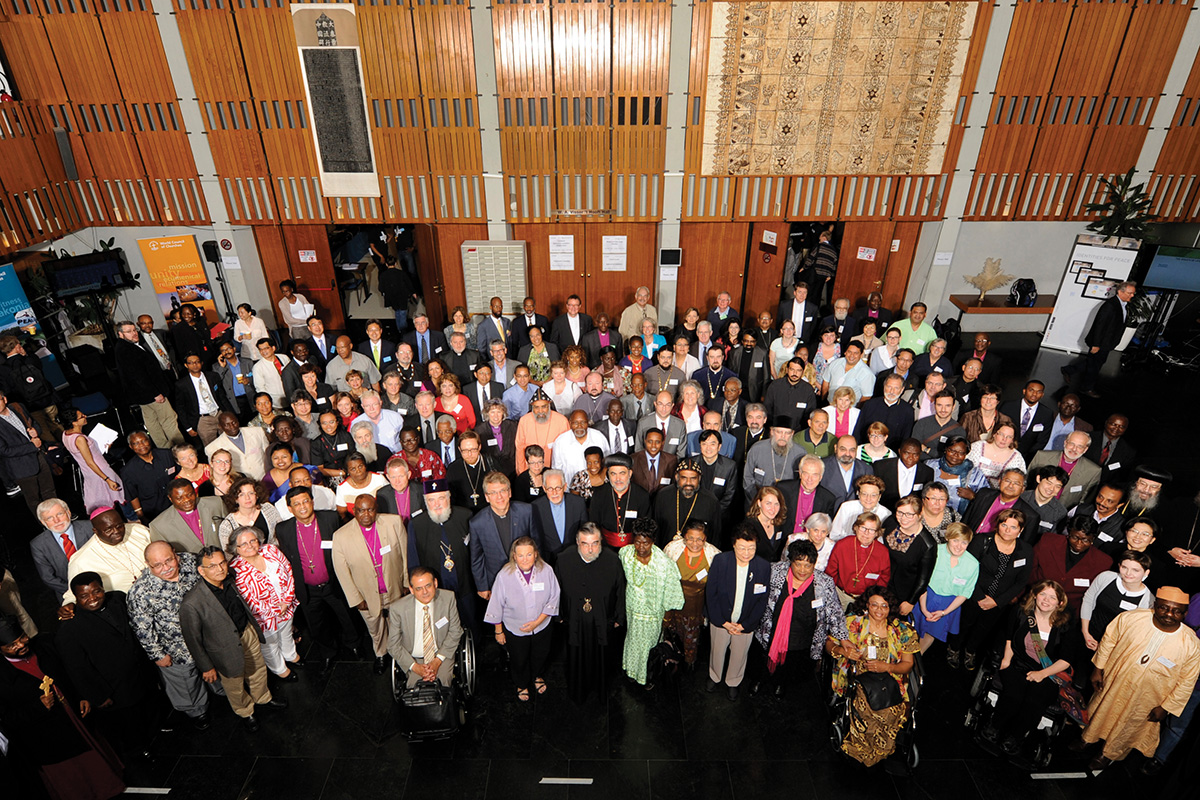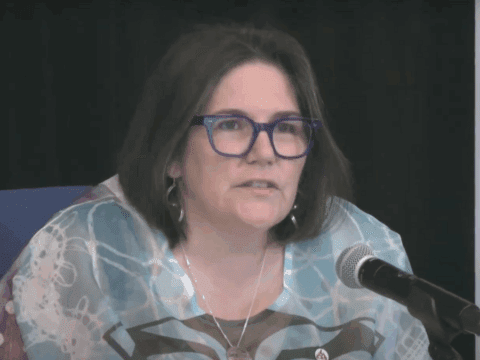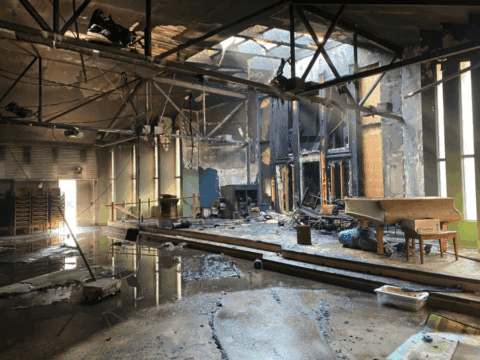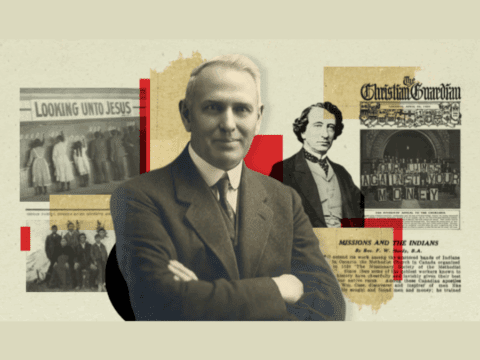At the outbreak of the Second World War, a fledgling ecumenical movement in Europe and North America was making plans for how a unified church could have an impact in the world. But as the fighting ramped up, many of the early members of this yet-to-be-formed body suddenly found themselves in the midst of a humanitarian crisis.
Madeleine Barot was one of those people. In the southwest of France, the young Protestant, accompanied by activist Jeanne Merle d’Aubigné, requested access into Jewish deportation camps. The pair was allowed in under the guise of being good Christian women who only wanted to look after women and children. But they arranged for Jews to safely sneak over the Swiss border under the cover of night.
“They put their lives on the line to get people out of those camps,” says Kristine Greenaway, who divides her time between the World Council of Churches’ publications office and The United Church of Canada’s French ministries unit.
When the war and its atrocities ended, the need for widespread peace and co-operation was clearer than ever. In 1945, 50 countries signed the United Nations Charter. Three years later, 147 churches and 1,200 delegates gathered in Amsterdam for the first assembly of the World Council of Churches (WCC), an organization first imagined at the turn of the century and endorsed by more than 100 church leaders in 1937. It would be a body committed to visible Christian unity, to collective action on important matters, and to service, mission and evangelism around the world. Most members were western and Protestant. Over time, Eastern Orthodox denominations and churches in Africa, Asia, Latin America and beyond began to join.
This year, the World Council of Churches turns 70. But the anniversary will be more than a simple celebration of its history. In a world of shifting demographics, increased diversity and growing challenges for the church, the role of ecumenical bodies — and their ability to remain relevant — will likely steal some of the spotlight.
Founded amid conflict and human suffering, the WCC has been active in social justice from the start. Following the Second World War, Europe was flooded with refugees, and the WCC made a commitment to help. During the Cold War’s tension between the United States and the Soviet Union, the Council kept communications alive across the Iron Curtain. In 1969, it took aim at the apartheid system in South Africa and launched the Programme to Combat Racism, which funded liberation movements and provided a framework for dialogue and criticism of racial segregation.
The initiative was controversial, to say the least. Some member churches argued that the money was going to groups then seen as terrorist organizations. But Greenaway says the program played an important and influential role in the church community’s global fight against racism. “It not only gave practical and spiritual support to those advocating for the apartheid system to be dismantled,” she says, “it also [planted] seeds and created networks and contacts that have led to initiatives to work against racism in many contexts.”
Today, the WCC is just one of a number of international ecumenical bodies committed to the unity of the church, but it is the largest of those bodies, with 348 member churches in more than 110 countries and territories, representing more than 500 million Christians worldwide.
The WCC’s Assembly — its main governing body — meets every eight years for a huge gathering that in past years saw about 3,000 participants. The body’s funding comes mainly from membership dues, Assembly revenue and rental agreements. A staff of 143 people, most based in Geneva, Switzerland, enables the WCC to do its work.
A lot of that work is still related to social justice. The organization’s 2016 annual review contains activities as wide-ranging as supporting humanitarian work near ISIS-occupied areas of Iraq, advocating for low-carbon economies to fight global warming, and the Ecumenical Accompaniment Programme in Palestine and Israel, which sends peaceful observers to watch for human rights violations and provide a sense of security.
The creation of the emergency aid and development organization ACT Alliance is another recent example of the WCC’s impact. ACT (Action by Churches Together) Alliance was launched in 2010 primarily as an effort of the WCC and the Lutheran World Federation. “We needed to get away from the circus of each individual church or organization coming in and doing their own thing,” says Greenaway, noting that a united effort helps avoid duplication and better mobilizes resources.
ACT Alliance responds to disasters and major crises and also works toward long-term sustainable development and advocacy in more than 100 countries. It has access to a staff of 25,000 people from member organizations and brings in $1.5 billion for its work each year.
But today’s post-Christian world is very different from the one that existed when the WCC was first formed. Sharp drops in church membership in the western world, the growth of the church in developing nations and increasing diversity in the West thanks to immigration have challenged the ecumenical organization to keep pace.
“‘Transformation’ is a key word in the life of the WCC,” acknowledges Greenaway. “In order to be relevant, [the WCC] must keep abreast of social and church movements and must anticipate what that means for a global organization with local membership.”
Between 2007 and 2012, the WCC facilitated a working group, the Continuation Committee on Ecumenism in the 21st Century, to study what the future has in store for the ecumenical movement and what the WCC might have to do to stay relevant. The working group wrestled with a number of issues: how to strengthen relationships with non-members, such as Roman Catholics, Pentecostals and some evangelical bodies; how to engage young people; how to respond to diversity and globalization; and how to incorporate marginalized and new voices. The basic question: how much change is needed? Should just the organizational and administrative structures be adjusted, or should the changes be more fundamental — finding new ways of thinking, behaving and relating to each other?
The committee’s final recommendations emphasized the need for ecumenical bodies to find ways to do all of the above, but the definitive answers are still open for discussion.
One possible way forward is a shift from a strict definition of ecumenism — unity among Christian churches — to an interfaith focus. “I think the WCC can be a broker of interfaith discussion that is meaningful,” says Greenaway. “It can bridge the gap among faiths in a disparate world.”
The WCC is also working on a push toward broader Christian unity, including reaching out to evangelical and Pentecostal denominations and continuing its current collaborations with the Roman Catholic Church. “Society is fragmenting, and along with it, so are institutions such as the church,” says Greenaway. “Where I see evidence of increased unity is in the growth in understanding and acceptance among many Christians from different traditions.”
Rev. Stephen Kendall agrees. Principal clerk at the Presbyterian Church in Canada, Kendall has been involved in various capacities with both the WCC and the World Communion of Reformed Churches for about 14 years. “I think the Assemblies are important. For smaller, isolated or oppressed churches, this is the only way for them to get together. We need to be in the same room as Christians from Syria or Indonesia or the Pacific islands or Pakistan,” he says, referring to places where Christians are either being persecuted or the church is disappearing. “It gives them a little bit of a lifeline. For them, connecting to the global Christian community is really important.”
The WCC started 70 years ago as a way to work together to make the world a better place. It’s still a worthy goal, but it feels more complicated in 2018. That makes finding a way to be united, in even broader ways, so much more important.
The WCC now has a new initiative: the Global Christian Forum, a more neutral and less structured platform than regular Council meetings. It’s a broader group that acts as a place of encounter between evangelicals and Pentecostals and mainline churches.
It’s a gathering place of common ground, Kendall adds. “It may be part of the future of the ecumenical movement.”
This story originally appeared in the January 2018 issue of The Observer with the title “70 years of solidarity.”















